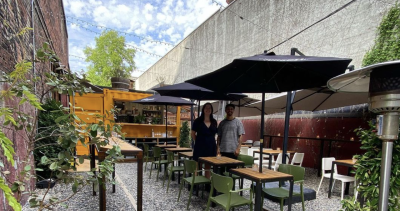Vancouver resident Mohamed Fahmy once again finds himself in midst of Middle East standoff
It's one of the stranger headlines you're going to see in a mainstream newspaper: "Journalist Joins His Jailer's Side in a Bizarre Persian Gulf Feud".
This weekend, New York Times reporter David D. Kirkpatrick revealed a surprising twist in the story of Vancouver resident Mohamed Fahmy.
He's the former Cairo bureau chief for Al Jazeera's English network imprisoned for more than 400 days by the Egyptian military regime.
In 2015, Fahmy filed a $100-million lawsuit in B.C. Supreme Court against Al Jazeera, which is funded by Qatar's ruling family, the House of Thani.
He claimed that the station put him at risk by covertly supporting Muslim extremists on its Arab-language network.
According to Kirkpatrick's story, Fahmy's computer was hacked and this "revealed that a senior official of the United Arab Emirates later provided $250,000 to help pay for the legal action".
Fahmy acknowledged to the New York Times that he received a loan from the Emirati ambassador to the United States, Yousef al-Otaiba, and that they were high-school friends in Egypt. Fahmy also told the New York Times that he didn't receive a penny and that all the money was forwarded to a third party.
Last month, the United Arab Emirates, Saudi Arabia, Bahrain, and Egypt imposed a blockade on Qatar, alleging that it's supporting terrorism in the region.
Saudi Arabia issued 13 demands to lift the blockade. One was a call for the Qatari government to shut down Al Jazeera. The Saudis also want Turkish troops out of Qatar, reduced contact between Qatar and Iran, and an end to Qatari support for the Muslim Brotherhood. The Saudis themselves have also, in the past, been accused of supporting Islamists in the region.
https://twitter.com/MFFahmy11/status/878699101612912640[/tweet[Fahmy recently attended a news conference in Washington, D.C., where he accused Qatar and Al Jazeera of cooperating with Islamists.
He has also tweeted his objections to Turkey jailing journalists as part of a government crackdown following a failed coup attempt.
[tweet]https://twitter.com/CRNetInt/status/879574940734902274
According to the New York Times, a lengthy report about Fahmy was distributed to journalists "by intermediaries sympathetic to Qatar".
Fahmy insisted that the allegations in the report, including one claim that he was a long-time spy for Italy, were part of "a systematic campaign to smear my reputation".
Before Fahmy heard the verdict in a retrial of his case in Egypt in 2015, he was offered a job as an adjunct professor of journalism at the University of British Columbia.
He maintained that he was caught in a political crossfire between Egypt and Qatar because he was working for Al Jazeera.
“It’s not a secret that Qatar, the owner of Al Jazeera, has supported the Muslim Brotherhood politically,” Fahmy told the Straight at the time.















Comments